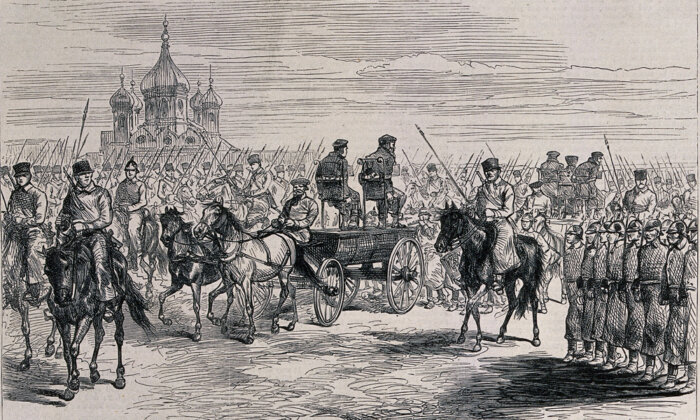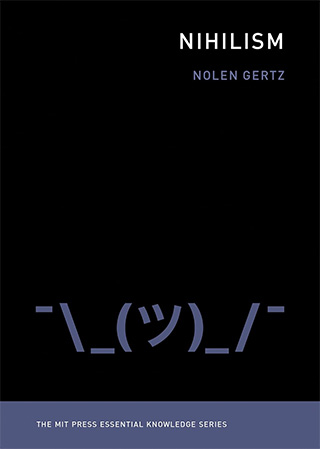Engaging in ritual for ritual’s sake only deepens nihilism.
 Russian nihilists tied to chairs on horse-drawn platforms and paraded past groups of soldiers on their way to execution in St. Petersburg. Source: Wikimedia Commons.
Russian nihilists tied to chairs on horse-drawn platforms and paraded past groups of soldiers on their way to execution in St. Petersburg. Source: Wikimedia Commons.Earlier this year, a fertility clinic in Palm Springs, California, was bombed. Around the same time, authorities in Washington foiled a mass shooting plot at a local mall, while Europe saw a string of stabbing attacks.
These and other incidents have fueled warnings about the rise of what the FBI calls “Nihilistic Violent Extremists,” or NVEs. Unlike conventional terrorists, these terrorists, says the FBI, are motivated by nihilism, driven “primarily from a hatred of society at large and a desire to bring about its collapse by sowing indiscriminate chaos, destruction, and social instability.”
But how can believing in nothing drive people to commit acts of violence, when terrorism is usually defined by devotion to a cause? How can we make sense of this?
 Nolen Gertz is the author of “Nihilism.”
Nolen Gertz is the author of “Nihilism.”The New York Times columnist David Brooks offers one explanation. In a recent op-ed, he warns that a rigid political climate on the left has led people on the right of the political spectrum to actively embrace nihilism. Whereas conservatives like himself had formerly been focused on conserving cultural, intellectual, and political traditions, Brooks worries that some people on the right are now embracing postmodernism and becoming “radical deconstructors” who “don’t seem to think there’s anything to conserve,” which leads them to “make the leap into pure nihilism, pure destruction.”
He likens this trend to the rise of 19th-century Russian nihilists, whom writers like Turgenev and Dostoyevsky depicted as rejecting established norms and seeking radical upheaval. For Brooks, the pattern echoes what he sees in historical episodes of social and political turmoil, from Tsarist Russia to interwar Germany.
In other words, he suggests that we are today facing a situation similar to what led to the rise of the Nihilists in 19th-century Russia and the rise of Nazism in 20th-century Germany. Brooks seems to think these situations are comparable because of a historical trend he has identified: “smothering progressivism” leading to “populist reaction” and then “nihilist surge.”
Engaging in ritual for the sake of ritual is precisely what led to the crises that Turgenev and Dostoyevsky were writing about.
But this trajectory describes neither Tsarist Russia nor Weimar Germany, which calls into question Brooks’ diagnosis of what is happening today. In fact, as I discuss in the opening of my book “Nihilism,” what inspired the Russian Nihilists was actually a situation much closer to what Brooks sees as the solution to nihilism: “to believe in belief.”
What Turgenev and Dostoyevsky identified as the threat of nihilism was not the threat of people responding to progressivism with violence, but rather the threat of people responding to conservatism with violence. The rise of the Russian Nihilists was brought about specifically by the conservatism that Brooks identifies with: conservation of the status quo. Brooks sees “one spot of good news” in recent studies that have shown that more young people are returning to church, which he interprets as a desire to have faith in something. So just as Brooks wants to combat nihilism by getting people to believe in belief, he sees hope in people having faith in faith.
Yet engaging in ritual for the sake of ritual is precisely what led to the crises that Turgenev and Dostoyevsky were writing about, as more and more young people in Russia were becoming disillusioned by rituals and institutions that seemed to have no meaning or significance beyond honoring tradition for the sake of tradition. The Russian Nihilists thus turned to destruction, not because they lacked conviction, but rather because of the strength of their convictions, specifically the conviction that the only way to find out what, if anything, was worth believing in was to find out what could survive destruction.
Like those who misread Nietzsche and think his claim that “God is dead” meant we should all become atheistic nihilists, Brooks seems to think that postmodern atheism is the cause of nihilism and so believes the only way to overcome nihilism is with theism. And for Brooks, it seems that any version of theism will do, as just having “faith in something” is all that matters. Yet it was precisely this way of thinking that Nietzsche identified as what was helping to spread the disease of nihilism.
As I discuss elsewhere in the book, Nietzsche viewed the death of God as an opportunity for people to actively decide for themselves what values to uphold rather than merely continuing to passively accept the traditions or authority of others as grounds for how to live. Yet Nietzsche feared that rather than take up this opportunity, we would simply create new gods to worship, and so continue to passively let others decide how we should live rather than actively take resposibility for our own lives. Nihilism for Nietzsche thus did not mean to not have beliefs, but rather meant believing in nothing: maintaining convictions that have no real significance, simply believing in belief.
Hannah Arendt similarly worried that democracy was becoming an empty ritual that was being practiced merely for the sake of practicing it.
Hannah Arendt similarly worried that democracy was becoming an empty ritual that was being practiced merely for the sake of practicing it. Arendt feared that politics was increasingly coming to be seen as a dirty word, as something to be avoided whenever possible, and so was becoming something people only participated in by voting in elections. Voting became all that mattered according to Arendt because voting became a way to outsource politics to politicians, thus freeing everyone else from having to be concerned with politics until the next election cycle came along.
But as Arendt warned, this reduction of democracy to an empty ritual entailed that democracy would devolve into bureaucracy, to what she called the rule of nobody. In a society where no one wants to take responsibility, bureaucrats have all the power because they know how to maintain the rituals that undergird society and so maintain the appearance of democracy. So it would come as no surprise to Arendt that we are now trying to replace human bureaucrats with AI bureaucrats in order to create a nihilistic utopia: a society where finally no human should ever have to risk taking responsibility.
What Arendt points to then as the way to combat nihilism is through the rehabilitation of politics. So rather than wanting people “to believe in belief,” or be happy that people are going to church “to have faith in something,” Arendt would probably argue that we need to work to bring back the Ancient Greek model of the polis and in particular the Ancient Greek model of politics as what gives life meaning.
According to Arendt, the Ancient Greeks did not seek to avoid politics so they could stay home, but rather sought to avoid the home so they could gather in the marketplace and participate in politics. Young people seeking out churches would indicate for Arendt not that religion will save us from nihilism, but rather that young people are desperate to find places to meet other young people that aren’t online.
So if we want to combat nihilism we need to create more places where people can meet face to face, places where people can engage in the Ancient Greek model of politics: recognizing that we each have a limited view of the world and so can only grow as humans by sharing with each other how we see the world.
Nolen Gertz is Associate Professor of Applied Philosophy at the University of Twente in the Netherlands and the author of “Nihilism.”
.png)



